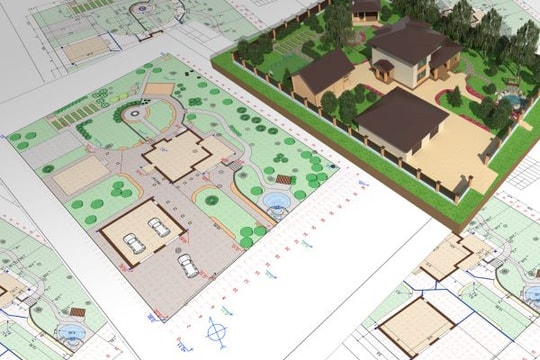When is land recovered for socio-economic development?
Land acquisition for socio-economic development is the most common case when the State acquires land. So, when is land acquired for socio-economic development?. The concern of Ms. Tran Huong Thao (Nghia Dan, Nghe An).
Reply:Cases of land recovery for socio-economic development
According to Article 79 of the 2024 Land Law, the State recovers land for socio-economic development in the national and public interest to promote land resources, improve land use efficiency, develop modern socio-economic infrastructure, implement social security policies, protect the environment and preserve cultural heritage.
Specifically, cases of land recovery for socio-economic development include:
- Construction of traffic works (highway, road, urban road...);
- Construction of hydraulic works (dykes, embankments, culverts, dams, spillways, reservoirs, etc.);
- Construction of water supply and drainage works (water plants; water pumping stations; tanks, water towers, etc.);
- Construction of waste treatment facilities (transfer stations; landfills, etc.);
- Construction of energy and public lighting works (power plants and auxiliary works of power plants; dams, embankments, reservoirs, water pipes serving hydroelectric plants, etc.);
- Construction of oil and gas projects (exploitation platforms, facilities serving oil and gas exploitation and processing, petrochemical refineries, gas processing plants, biofuel production plants, etc.);
- Construction of postal, telecommunications and information technology infrastructure works (other related technical infrastructure works to install telecommunications equipment; data centers; ...);
- Building traditional markets and wholesale markets;
- Construction of religious works (communal houses, temples, shrines, pagodas and other legal religious works);
- Construction of religious works (headquarters of religious organizations, affiliated religious organizations; pagodas, churches, chapels, cathedrals, holy places...);
- Construction of public entertainment and recreation areas, community activities (parks, flower gardens, beaches and other public entertainment areas...);
- Construction of headquarters of agencies of the Communist Party of Vietnam, State agencies, the Vietnam Fatherland Front, socio-political organizations, socio-political-professional organizations, socio-professional organizations, social organizations and other organizations established in accordance with the provisions of law, assigned tasks by the State, and supported with regular operating expenses;
- Construction of headquarters or representative offices of public service units under the agencies of the Communist Party of Vietnam, State agencies, and socio-political organizations;
- Construction of cultural facilities, historical-cultural relics, scenic spots and landscapes (conference centers, theaters, cultural houses, cultural centers, cultural palaces, clubs, cinemas, circuses, etc.);
- Construction of medical facilities and social service facilities established or permitted to operate by the State (medical examination and treatment facilities; rehabilitation facilities; preventive medical facilities, etc.);
- Construction of educational and training facilities established or permitted to operate by the State (nursery schools, kindergartens, preschools, general education facilities, etc.);
- Construction of sports facilities established or permitted by the State (sports complexes, training centers, sports athlete training centers, etc.);
- Building scientific and technological facilities established or permitted to operate by the State (research and development organizations, scientific and technological services, etc.);
- Construction of diplomatic facilities (headquarters of embassies, consulates, etc.);
- Construction of public works on environmental treatment, biodiversity conservation, meteorology, hydrology, inspection and quarantine of animals and plants;
- Implementing investment projects to build social housing and housing for the People's Armed Forces, except for cases of agreements on receiving land use rights; investment projects to build public housing; investment projects to renovate and rebuild apartment buildings, except for cases where apartment owners agree to transfer land use rights to investors to implement investment projects to renovate and rebuild apartment buildings;
- Implementing projects to build industrial parks, industrial clusters, high-tech parks, high-tech agricultural parks; concentrated information technology parks; high-tech forestry parks; duty-free zones in economic zones;
- Implement projects for concentrated production and processing of agricultural, forestry, aquatic and seafood products on a large scale, with synchronous infrastructure from production to processing of agricultural, forestry, aquatic and seafood products serving inter-district, inter-provincial or inter-regional areas; projects for planting and preserving medicinal plant genes to develop traditional medicinal herbs;
- Carry out sea encroachment activities;
- Mineral exploitation activities are licensed by competent authorities;
- Projects in the vicinity of traffic connection points and traffic routes with development potential;
- Implement investment projects to build urban areas with mixed-use functions, synchronizing technical infrastructure systems, social infrastructure with housing according to the provisions of law on construction to build new or renovate and embellish urban areas; rural residential area projects;
- Cemeteries, funeral homes, crematoriums, ash storage facilities;
- Implement projects to allocate residential land and production land for ethnic minorities to implement land policies for ethnic minorities;
- Construction of above-ground works to serve the operation, exploitation and use of underground works;
- Implement projects approved by the National Assembly and the Prime Minister, and decide on investment policies;
- Projects and works for other national and public interests.
Note: The land plot to be recovered can be known in advance because the annual land use plan of the district level determines the location and area of land to be recovered and according to regulations, the annual land use plan of the district level must be made public.
Thus, land is only recovered for socio-economic development for national and public interests if the land belongs to projects in the above cases.
- Compensation will not be based on market price but will be based on specific land price (State price) for each location and specific time decided by the People's Committee at provincial or district level.
People whose land is recovered for socio-economic development for national and public interests have the obligation to comply. If they do not comply, they will be forced to do so. In case they do not agree with the compensation price or the recovery decision, they have the right to complain or file a lawsuit (provided that there is a basis).





